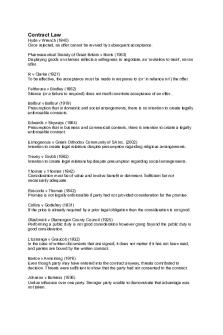Law and Ethics Terms and Definitions PDF

| Title | Law and Ethics Terms and Definitions |
|---|---|
| Course | Ethics and Law in Health |
| Institution | Edith Cowan University |
| Pages | 2 |
| File Size | 86.5 KB |
| File Type | |
| Total Downloads | 98 |
| Total Views | 142 |
Summary
Terms with Definitions...
Description
Law and Ethics Terms and Definitions Autonomy
Independence, self-rule, self-governance, making one’s own decisions
Beneficence
Advocacy, taking positive actions to help others
Non-Maleficence
Avoiding harm where possible. If it is necessary to cause harm to achieve benefit, ensuring the benefit outweighs the harm
Justice
Fairness, equity (relating to distribution of resources).
Fidelity
Keeping promises
Veracity
Truth telling
Principles of Utilitarianism
The greatest good for the greatest number The end justifies the means
Deontology
Study of duty. Right is right and wrong is wrong.
Obligatory beneficence
The obligation of health professionals to act for the benefit of others when in a position to do so.
Specific beneficence:
Directed to specific parties such as children, friends and patients
Non-maleficence and healthcare
In essence: A person who is treated by a health practitioner should not be worse off as a result of their treatment than when they initially presented.
Doctrine of double effect
The bad effect can be foreseen, tolerated and permitted but must not be intended. For example: Termination of pregnancy if the mother has cancer of the cervix and requires life-saving treatment
Doctrine of necessity
Drs treating when they need to – For example treating an unconscious patient as they have no family or identification near them at the time
Medical futility
Health Care Professional not obliged to provide futile treatment. For example: Not For Resuscitation/Do Not Resuscitate
Burdens versus Benefits
Excessive pain, discomfort or distress of the treatment will have on the patient’s life
Quantity versus Quality of life continued
Quality of life shifts the focus on whether the treatment is beneficial to whether the patient’s life is beneficial- allows for active euthanasia.
Personhood
A rational, thinking being that considers itself as itself in time and space. Mental capacity is a fundamental element of personhood.
Morally wrong but legally right
– –
Slavery Nazi Germany
- Apartheid – South Africa - Termination of pregnancy?
Legally wrong but morally right
– –
Euthanasia? Killing one person to save four people who will die if the other person is
–
not killed? Speeding to the hospital with a person who needs urgent medical assistance
Bioethics
Is concerned with the ethical issues arising from health care, biological and medical sciences. Examples to consider: Termination of pregnancy / contraception / organ donation and transplantation / withdrawal of life-sustaining treatment
Paternalism
Behaving like a parent and forcing the citizen to behave in their best interest. For example making them wear seat belts.
Acts and Omissions
Whether an agent actively intervenes to bring about a result, or omits to act in circumstances in which it is foreseen that as a result of the omission the same result occurs....
Similar Free PDFs

Terms and definitions
- 5 Pages

Chapter 4 Terms and Definitions
- 5 Pages

Chapter 1 Terms and Definitions
- 4 Pages

Law and ethics cases
- 4 Pages

Ethics and Cyber Law
- 5 Pages

Ethics, Law and Justice Notes
- 36 Pages

Biomechanical terms - Definitions
- 10 Pages

04 Definitions and Models
- 11 Pages
Popular Institutions
- Tinajero National High School - Annex
- Politeknik Caltex Riau
- Yokohama City University
- SGT University
- University of Al-Qadisiyah
- Divine Word College of Vigan
- Techniek College Rotterdam
- Universidade de Santiago
- Universiti Teknologi MARA Cawangan Johor Kampus Pasir Gudang
- Poltekkes Kemenkes Yogyakarta
- Baguio City National High School
- Colegio san marcos
- preparatoria uno
- Centro de Bachillerato Tecnológico Industrial y de Servicios No. 107
- Dalian Maritime University
- Quang Trung Secondary School
- Colegio Tecnológico en Informática
- Corporación Regional de Educación Superior
- Grupo CEDVA
- Dar Al Uloom University
- Centro de Estudios Preuniversitarios de la Universidad Nacional de Ingeniería
- 上智大学
- Aakash International School, Nuna Majara
- San Felipe Neri Catholic School
- Kang Chiao International School - New Taipei City
- Misamis Occidental National High School
- Institución Educativa Escuela Normal Juan Ladrilleros
- Kolehiyo ng Pantukan
- Batanes State College
- Instituto Continental
- Sekolah Menengah Kejuruan Kesehatan Kaltara (Tarakan)
- Colegio de La Inmaculada Concepcion - Cebu







